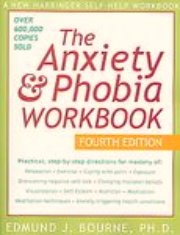|
Types of Negative Self-talkMuch of this section is from "The Anxiety and Phobia Workbook" by Edmund J. Bourne, PH.D pages 164-168. Bourne breaks down some of the causes of anxiety into "subpersonalities". Each plays a different role in an individual. The key is to identify which one(s) has the strongest hold on you and start to counter their negative self-talk with positive, self-assuring statements. The Worrier creates anxiety by imagining the worst case scenario and scares you with ideas of disaster and catastrophe. The worrier over-reacts to the first physical symptoms of panic (such as sweaty palms, tightening chest or increased heart rate) and promotes fears that what is happening is dangerous and embarrassing. In reality, no one has ever died or been hurt by a panic attack. It is simply a part of our natural "fight or flight" reaction to the fear that our survival is in jeopardy.(see or click my 'Anxiety/panic attack' menu button) The worrier is ever vigilant, watching with uneasy anticipation for any small sign that trouble is ahead. It over-estimates the odds that something bad or embarrassing will happen and imagines scenes of failure and disaster. The worrier's favorite expression is "what if..." Our self-talk from the worrier's perspective will say "Oh no! My heart is beating faster. What if I panic and completely lose control." "What if I'm alone and there is no one around to help me?" What if I do something that is really embarrassing?" This fretful fear can immobilize a person and keep them from really living, due to the anxiety that it produces.

The Critic is the part of you that is constantly judging and evaluating your behavior and promotes a low self-esteem. It tends to point out your flaws and shortcomings whenever possible. It highlights your mistakes and reminds you that you are a failure. It tends to ignore your positive qualities and emphasizes your weaknesses and shortcomings. The critic generates anxiety by putting you down for not being able to handle your panic symptoms or anxiety, for not being able to go places that you used to be able to go, or for having to be dependent on someone else. It also loves to compare you to others with you always falling short. The critic sounds a lot like a dreaded teacher or the voice of your father or mother. The critic's favorite expression is: "What a disappointment you are!", "That was stupid", "What an idiot you are", "Can't you ever get it right?", "I am inferior to others", or "I am not worth much". The Perfectionist is a close cousin to the critic because it is less concerned about putting you down but tries to push you to do better, but is rarely satisfied. It promotes chronic stress and burnout. It keeps reminding you that you can always do better and you should be working harder, your efforts are not good enough, you should always be pleasing, competent, and should always have everything under control. The critic's favorite expressions are: "I should... I have to ... I must". It wants you to be the best and is intolerant of mistakes or setbacks. It tries to convince you that your self-worth is dependent on externals like: vocational achievement, money, status, acceptance by others, or the ability to please others. The critic does not believe that there is any notion of inherent self-worth but pushes you into stress, exhaustion and burnout.
Countering Negative Self-talk
The best way to deal with negative self-talk is to counter it with positive, self-supportive statements. It starts by writing down and rehearsing statements that directly refute and invalidate your negative self-talk. It has taken you years to develop your negative, anxiety producing, self-statements and it will take some practice and time to extinguish them. You must slow down your automatic thoughts, and really pay close attention to what you are saying to yourself. These four subpersonalities will help you to decipher which is your favorite way to generate anxiety. I'm sure that the example expressions have rung true for you in at least one of these areas. Some of your expressions are just bad habits and you don't want to be deceived by them any more. Some are deep seated and you still believe that they are true. You can weaken the hold of your negative self-statements by exposing them to the following Socratic questions or through rational investigation. Also, review the 15 ways we distort our thinking by going to the distorted thinking menu button on the left side of this page. It is a matter of telling yourself the truth! What is the evidence for this? Is it always true? Has this always been true in the past? What are the realistic odds of this really happening? What is the very worse that this could happen? What would you do if the worse did happen? Are you looking at the whole picture? Are you being completely objective? |
